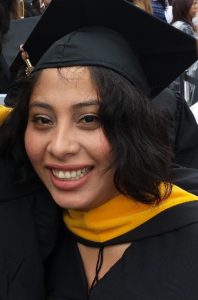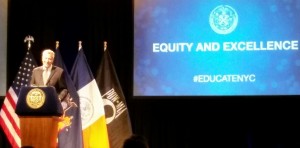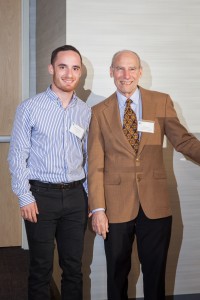More than 60% of students entering CUNY community colleges place into a remedial mathematics course. For the vast majority, that means they must pass an elementary algebra course and the CUNY Elementary Algebra Final Exam (CEAFE) to exit remediation and to have any chance of every obtaining a degree. Each semester, more than 50% of students in elementary algebra do not pass the course.
But why is algebra so important that we decree every college student must demonstrate current proficiency in a fairly rigid list of topics and skills before being able to graduate regardless of major? One very common answer is the tautology “Because algebra is part of a well-rounded education.” But where are the data and evidence to support this claim? Indeed, most conversations I have about algebra outside of academia tend to include the phrase “What was the point? I’ve never used it in ‘real life’”.
The truth usually lies somewhere in between, and to me, it seems that the answer really depends on what you consider to be algebra. If algebra is the monolithic list of topics that make up most college algebra courses, then I would agree with those asking “what is the point?” But most, if not all, of us use numeracy and mathematical skills in every day life, and so I wanted to know which are the important concepts from typical algebra courses that we use in “real life”?
As someone who teaches developmental and college algebra, researches abstract algebra and most recently helps his daughter with her algebra homework, I am fairly certain I use more algebra on a daily basis than the average person. So I decided to ask friends, family, colleagues in other academic disciplines, and even strangers on Twitter, how they use math and which concepts and skills are important to them in their work and daily life.
Here are some of the things they told me:
“in my day to day work/home, mostly % and unit rates/ratios, descriptive stats.”
“…as an insurance underwriter I spend my day working with percentages”
“Steamfitters use math for calculating piping offsets, structural supports, pipe fabrication, etc…… trig……. Some Calculus when dealing with refrigerants, chemicals, gasses,etc.”
“Interest rates for loans and credit cards. Budgeting for household expenditure.. Being able to understand how badly journalists and politicians use statistics.”
“Supermarket stuff every day : is X a better deal than Y based on volume and cost?”
“Working out how much paint to buy according to size of walls….. square metres!”
“In music, tempo, time signature, note values, etc.”
“Figuring out the damn tip on a restaurant bill. (Or who owes what in large parties). Life budgets. How much IS 20% off of that dress?”
“Algebra for Cooking: Scaling up/down and going from rectilinear to circular pans in recipes. “
“Adapting a knitting pattern to a new size that wasn’t included in the directions”
“We found ourselves delving into trig and Pythagoras recently working out an order for shutters for an eight part bay window.”
“trying to understand the long-term consequences of taking the student loan v. helping [our children] out….”
Summarizing, almost everything fell into these categories:
- Percentages – Almost everyone said this
- Proportions – this encompasses unit conversion skills related to supplies, materials, costs, nutrition, health, etc
- Descriptive Statistics – finding averages, describing distributions as well as being able to understand and interpret data and charts from business, politics, media, etc
- Geometry and Trigonometry
- Inferential statistics.
And in general, the common theme was in using arithmetic and logical reasoning skills in context rather than abstractly. Certainly, some skills from a standard algebra curriculum are needed for the above. I would say:
- Arithmetic, including order of operations – with a calculator!
- Simplifying linear expressions.
- Solving linear equations.
- Solving proportions, including percentage problems.
- Geometry including area and volume.
- Radicals including Pythagorean theorem.
However, I don’t believe operations on nonlinear polynomials, factoring and solving quadratic equations, simplifying complicated exponent expressions, and solving radical and rational equations are vital in order to master the aforementioned skills people use.
So the question is this: Why should all students be proficient in algebra to graduate, when an overwhelming percentage of successful adults in professional and even academic careers never use much of it? Before I offer my answer, a couple of caveats.
- Students on STEM degree paths need algebra.
- We should not create a two-tier system, which bars students from algebra. Every student should have the opportunity to take algebra if they wish to, and to be informed of the implications of not taking it and of the alternatives.
But what about the third type of student who is generally capable of the academic work required to obtain a degree in a non-STEM field and be a productive member of society, but is prevented or delayed from doing so because they failed elementary algebra?
In November 2014, The American Mathematical Association of Two-Year Colleges issued a position statement on “The Appropriate Use of Intermediate Algebra as a Prerequisite Course” that concluded
“NOW, THEREFORE, It is the position of AMATYC that: Prerequisite courses other than intermediate algebra can adequately prepare students for courses of study that do not lead to calculus.”
Some progress has been made, notably through the California Acceleration Project and their pre-Statistics Courses. At CUNY, there are some Community Colleges experimenting with Carnegie’s Statway and Quantway, as well as the very promising experiment mainstreaming remedial students into a Statistics course conducted by former EVC Lexa Logue and Mari Watanabe-Rose (pdf link).
But significant resistance remains, largely in the form of the aforementioned proclamation that “algebra is part of a well-rounded education.” I believe that we must continue to design and implement alternative pathways in mathematics to better serve the students who traditionally get stuck in remediation; Either through alternative remediation, or preferably in mainstreaming those students into an existing credit-bearing Quantitative Reasoning or Statistics course with extra support for their basic skills. These courses should be supported by proven pedagogy and contextualization of the topics.
Furthermore, I believe such decisions and designs must not rest solely with Mathematics departments, which are service departments in Community Colleges, but in communication with faculty in other academic departments who know what mathematical skills are required to be successful in their courses. We should partner with other disciplines, by collaboratively developing learning outcomes and sharing pedagogical techniques, to help them to support our students’ mathematical learning throughout their education. They deserve nothing less.
 ns to the Class of 2016!
ns to the Class of 2016!
 through college.
through college.


